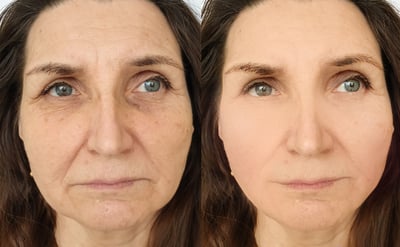
Looking in the mirror in the morning, chances are that seeing tired eyes and dull skin don’t do much for your mood. On the flip side, waking up with bright eyes and glowing skin can give your whole day a boost. We’ve all experienced how liking what we see in the mirror, even in small ways, can improve how we feel on the inside.
In contrast, when we’re unhappy with our appearance, it can quietly erode our self-esteem. Think of the dressing room mirror that seems designed to amplify every flaw. Body image affects more than vanity; it can affect our confidence, shape our social life, and impact our emotional well-being.
That’s why many people explore cosmetic surgery—not out of superficiality, but out of a desire to feel comfortable in their own skin. But does changing how we look really change how we feel? And is this something we should even be striving for?
Redefining body positivity
Body positivity, at its core, is about agency—the right to define your own relationship with your body. For some, that means embracing every line and curve. For others, it means making changes that support how they want to feel, move, or show up in the world. Neither path is wrong.
Still, we can’t ignore the pressure created by filtered images, unattainable beauty standards, and the rise in cosmetic product marketing aimed at younger and younger audiences. In this environment, the healthiest choice isn’t necessarily what is the trendiest. It’s the one that’s yours.
In other words, cosmetic surgery should never be about chasing someone else’s ideal. When it’s approached with self-awareness, professional guidance, and a focus on emotional well-being, it can be a deeply personal form of self-care.
The psychological benefits of cosmetic surgery
Living with deep self-consciousness (about your nose, your midsection, or a lingering scar) can silently drain your confidence. You might avoid photos, turn down invitations, or skip events entirely. Over time, this kind of avoidance can make life feel smaller.
Cosmetic surgery, when done for the right reasons and with realistic expectations, can help people reclaim confidence and connection—not by enforcing unrealistic beauty standards, but by quieting the self-critical voice that once held them back.
Here are some of the ways cosmetic surgery can improve emotional well-being:
Confidence
When you’re no longer fixated on a feature that used to bother you, it opens up space to engage more freely with the world. Improved confidence can ripple into many parts of life: Applying for that job, going on a first date, or simply walking into a room with your head held high.
Social ease
Self-consciousness can make people withdraw from conversations, invitations, and even close relationships. When you’re constantly worried about how you look, it’s harder to feel relaxed around others. After cosmetic surgery, many people feel more confident stepping into social situations they used to avoid, including meeting new people, rejoining old friend groups, or simply being more present in daily interactions. In fact, a long-term study in Plastic and Reconstructive Surgery found that patients experienced significant increases in self-esteem and social confidence even five years after their procedure.
From social connection to wellbeing
This shift matters. Research consistently shows that strong social connection is one of the most important predictors of emotional well-being. When we feel comfortable being seen, we’re more likely to engage, and those human connections play a powerful role in supporting long-term mental health.
What cosmetic surgery can—and can’t—do
That said, cosmetic surgery isn’t a cure-all. People dealing with diagnosed mental health conditions like depression or body dysmorphic disorder (BDD) may not experience the same emotional benefit, and in some cases, surgery can even intensify underlying struggles. A reputable cosmetic surgeon will consider your full mental and emotional health before proceeding. And, if you happen to be in one of those categories, working with a licensed mental health professional might be the most supportive first step.
But isn’t it selfish to have cosmetic surgery for vanity purposes?
It’s a small mental step to associate a desire to look better with outright vanity. But the truth is, wanting to feel good about your appearance is a valid desire. In fact, that motivation often sparks other positive habits, like eating well, being active, or spending more time on self-care.
In “The Bright Side of Vanity”, published in Psychology Today, author Meg Selig explains that not only can the desire for good looks inspire us to become healthy; it can also help us to avoid unhealthy things that cause us pain. “If vanity helps you make a healthful personal change,” she writes, “what’s so bad about that?”
Some people who want to improve their looks try to do so through lifestyle changes, but still can’t get the results they desire. And some people who want to exercise can’t because of their breast size or extra weight. Cosmetic surgeries such as body contouring and breast reduction can give the boost needed to help them meet their goals so they can truly be happy with their appearance.
The importance of having a cosmetic surgeon who cares about your mental wellbeing
While cosmetic surgeons specialize in physical transformation, the best ones understand the emotional journey behind it. A good surgeon will support your overall wellbeing, not just your appearance.
That might include things like:
Recommending counseling services. You may be dealing with depression and anxiety that cosmetic surgery might reduce, but won’t eliminate completely. Talking to a therapist can help you deal with underlying issues to improve your mental health.
Helping you set realistic goals. You deserve to feel good about your body, but that doesn’t mean (and shouldn’t mean) trying to look exactly like someone else. A thoughtful surgeon will help you understand what’s possible, and what’s healthy to pursue.
Providing medical evaluations. A responsible surgeon will ensure you’re physically and emotionally prepared for surgery.
Delivering results you’ll be happy with. A successful procedure isn’t just about what’s visible in the mirror. It’s about whether you feel more aligned, confident, and free in your everyday life.
Ready to feel like the best version of yourself?
If you’re considering a cosmetic procedure, we’re here to support you. Contact a Forefront physician near you to start the conversation.





